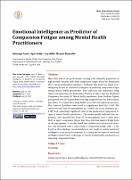Emotional Intelligence as Predictor of Compassion Fatigue among Mental Health Practitioners
Abstract
More than half of the professionals working with vulnerable population in
high-income countries suffer from compassion fatigue, which has detrimental
effects on mental health practitioners’ wellbeing. This study was aimed at investigating
the role of emotional intelligence in predicting compassion fatigue
among mental health practitioners. Data collection was undertaken using
surveys incorporating the Professional Quality of Life-5 and the Emotional
Competency Inventory 2.0. Mental health practitioners from Northern Uganda
participated with 207 respondents returning completed surveys. Data analysis
procedures were undertaken using Fisher’s exact test and logistical regression.
The statistical hypotheses were tested at a significance level of p ≤ 0.05. The
results revealed that self-management (p = 0.003) and social awareness (p =
0.039) had a statistically significant effect on the prediction of compassion fatigue
in mental health practitioners. The results equally indicated that respondents
who recorded low levels of self-management were 4 times more
likely to report compassion fatigue than those who had registered high levels
of self-management. It was also found that a relative increase in social awareness
was associated with a lower rating of compassion fatigue (OR = 1.24).
Based on these findings, recommendations were made to include emotional
intelligence as an integral component of training and incorporate emotional
intelligence intervention techniques to benefit mental health practitioners in
managing compassion fatigue.
Collections
- Research Articles [54]

